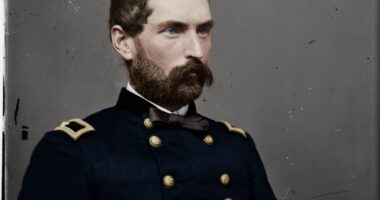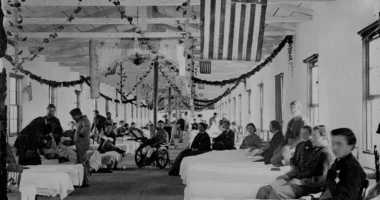While the new book from historian David Revere Allen is an excellent resource for the history of the Civil War, it does not cover the American Indian issue, and the topic of Native American relations with the Army is one that has been researched by many, but not well-presented. Allen’s book is a welcome addition to the knowledge base of the topic, and it is one I would highly recommend.
The Spanish-American war started in July, 1898, when the United States invaded Puerto Rico, Guam, and the Philippines in the name of national defense.
It was an early morning routine. The men of the 20th Maine Regiment were on the street, huddled in groups under cover of darkness, waiting for the order to march. Each company was paired with a Maine regiment of the 6th corps, and, as soldiers stood watch, the groups would talk, chain smoke cigars, and, if they were lucky, get some sleep.
During the Revolutionary War, an epidemic ravaged the Continental Army. Caleb Haskell survived to tell the story.
The newly formed Continental Army invaded the British Province of Quebec, in modern-day Canada, in September 1775, less than five months after the American Revolutionary War’s opening battles, with three objectives: persuade French-speaking Canadiens to join the revolutionary cause, seize control of strategically important sea routes, and drive the British out of Canada. Two independent military expeditions, headed by Colonel Benedict Arnold and Brigadier General Richard Montgomery, two Continental Army officers, approached Quebec City from the east and south, combined forces, and laid up camp outside the city before the end of the year. More than a thousand fatigued and weakened men lived in filthy conditions there, crammed into cramped quarters—a real Petri dish for smallpox epidemics. Montgomery’s forces were already fighting on borrowed time when he began the attack that became the Battle of Quebec on December 31. The British forces they were up against, on the other hand, were immune to smallpox thanks to herd immunity. Montgomery and 30 of his men were killed in the attack, while the British captured over 400 more.
Caleb Haskell, a member of the fife and drum corps from Newburyport, Massachusetts, who acquired smallpox, reported the spread in the American army. Haskell lived to tell the tale, and his wartime diary was published in 1881 as Caleb Haskell’s Diary: A Revolutionary War Soldier’s Record before Boston and with Arnold’s Quebec Expedition, from which the following sample was taken.
General George Washington ordered all American soldiers who had never been affected by smallpox to be injected as protection against the virus a year after the disaster in Quebec—the first large government-funded immunization campaign in American history.

Wednesday, December 6th.— The vast majority of the troops has arrived. We’re making preparations to lay siege to Quebec. The smallpox is all around us, and the army is in grave danger of contracting it. Every day, spies are sent out of Quebec, and virtually every day, spies are taken, both men and women. We have a strong garrison stationed around the city, and we took a small ship filled with provisions going for Quebec last night.
Thursday, December 7th.— We took 15 prisoners today. Several cannon shots were fired at our guards. There has been a terrible snowstorm.
Friday, December 8th.— We transported two field pieces down to the suburbs of St. Roche this morning to prevent the enemy from entering the city.
Saturday, December 9th.— Working on preparing guns and mortars to transport to St. Roche’s in order to cannonade the city. The guard was doubled in the evening. Our organization lost 32 men due to exhaustion. At 1:00 a.m., our battery launched about thirty shells into the city. A number of shells and gunfire were hurled at us. One of our men was injured. We’re erecting breastworks in several locations. At the Nunnery, I’m on the lookout.
Sunday, December 10th.— We moved our artillery and mortars from the suburbs this morning at daybreak. At morning, everything was still. With cannon and small guns, the enemy began to play on our guard and tiredness in the forenoon. The enemy came out of the city around midday and set fire to the suburbs of St. Johns, which burned for the remainder of the day and into the night. Two of those who came out were taken by our guards. We took five mortars down to St. Roche’s at night and fired forty shells into the city. The enemy continued to fire cannons at us and threw a lot of shells at us, but none of them hit us.
Monday, December 11th.— We have kept the enemy occupied by fortifying in one section of the city while attacking us from another. We are virtually through with our task. A man was injured and a lady was murdered by a gun fired from the city today. On the plains, we’ve completed our breastworks. In the middle of the night, we fired 35 shells into the city.
Tuesday, December 12th.— Extremely chilly. Our guards were relocated closer to the city, but there was no gunfire on either side today. I was on high alert at night. We prepared to storm the city by moving our artillery down to our batteries.
Wednesday, December 13th.— The enemy continued to fire cannon and small guns throughout the day. We were tasked with installing our cannon on our breastworks at night. In our breastworks, we had a number of shells hurled at us. We were chased away by the snow at 12 a.m.
Thursday, December 14th.— The adversary continues to fire on us from our breastworks. In our fort, three men were murdered and seven were injured. Tonight was spent getting ready to take on the city in the morning.
Friday, December 15th.— On both sides, a vigorous cannonading began early this morning and lasted several hours. We sent a surrender flag to the city, but it was turned down. The gunfire resumed and lasted until dusk. On our breastworks, one of our carriages was destroyed, and one guy was killed.
Saturday, December 16th.— Today was a slow day for firing. One of our men was killed by grape shot. I’m sick, and I’ve been out of commission for three days.
Sunday, December 17th.— I was taken to the hospital on a medical order. I couldn’t go because of a bad storm.
Monday, December 18th.— Myself and four other members of our group were taken to the Nunnery hospital. On both sides, everything is still the same.
Tuesday, December 19th.— Three of the people that came to the hospital with me today developed smallpox, and I’m experiencing the identical symptoms.
Wednesday, December 20th.— My bedfellow and I both had smallpox this morning; we were brought three miles out into the country and out of the camp; I’m quite sick.
Thursday, December 21st.— In our army, smallpox is spreading quickly.
Friday, December 22nd.— Poor attendance; no place to sleep in; no medicine to take; a sore throat that was causing a lot of discomfort.
Saturday, December 23rd.— My distemper is wreaking havoc on my body. It is not completed.
Sunday, December 24th.— I’m feeling considerably better today, and I’ll be able to sit for the majority of the day.
Monday, December 25th.—Christmas; a pleasant day. We haven’t received anything from the camp.
Tuesday, December 26th.— Today, two males were brought in with the smallpox.
Wednesday, December 27th.— Today, a man in our room died of smallpox. Every day, I’m growing better.
Thursday, December 28th.— Our warriors with smallpox are infesting every house in the neighborhood. It is well received by the majority of them.
Friday, December 29th.— We haven’t received anything from the camp.
Saturday, December 30th.— My distemper is quickly dissipating. Today I went to the front door.
Sunday, December 31st.— General [Richard] Montgomery planned to storm the city soon, according to reports from the camp. There has been a terrible snowstorm. About twelve o’clock tonight, one of our company members died of smallpox.
Monday, January 1st, 1776. We detected a hot engagement in the city around four o’clock this morning by the flame of cannon and small arms, but did not hear any report due to the wind and precipitation, which was a violent snow storm. General Montgomery, we assumed, had invaded the city. Everything was still just after daybreak. We are terrified and anxious to learn the details of last night’s events. I carried my clothes and pack on my back this morning, feeling weak and lame from the smallpox. I went back to the camp. All of my officers and three of my messmates had been taken or killed, and the rest of the company was in disarray. We were unable to obtain any specific information about the siege until the afternoon, when we obtained the following:
Our force was separated into different divisions to attack the city this morning about four o’clock, the predetermined hour to storm the city. Colonel [Benedict] Arnold was to cut the pickets running from the walls to the Charles River and enter the lower town as soon as the signal was given, while General Montgomery was to storm the upper town and mount the walls. They continued; due to the darkness, no discoveries were found. They were getting close to the walls when the enemy opened fire with cannon and small guns, indicating that they were prepared and expecting us that night. Several of our troops were killed or wounded here. Not to be discouraged, the rest pressed forward, cannons roaring like thunder and musket rounds flying like hail. Our men had nowhere to hide. A charge of grape-shot from the walls killed our General and his Aide-camp, as well as Captain Cheeseman [Jacob Cheesman], throwing our company into disarray. There appeared to be no officer in charge. Colonel Camrael approached and gave them the order to retreat. Colonel Arnold was injured and taken off the field, along with a number of his soldiers who were killed or wounded. The rest approached and cut the pickets, allowing them to enter the town with great difficulty, take command of the artillery, and secure a place to wait until morning. Hearing a loud shout and the firing stop, and not knowing what had happened, they assumed the General had entered and the city had surrendered. They discovered it was otherwise after it was light, much to their dismay. They discovered that they were surrounded with no way out and that they would have to surrender to their foes. As a result, we were defeated, with our General slain or captured, as well as over 400 of our officers and soldiers. Colonel Arnold’s party lost all of its captains, and only four of his men escaped, and they were all invalids. MHQ
The headline for this article in MHQ—The Quarterly Journal of Military History’s Summer 2023 issue (Vol. 33, No. 4) is: Pox Americana has a lot of experience.
Do you want MHQ’s beautifully illustrated, high-quality print edition delivered to your door four times a year? Now is a great time to subscribe and save!
Let’s face it. There are an awful lot of young men in the U.S. Army. There are also an awful lot of young men with mental health issues. But did you know that the young men with mental health issues—known as G.I. Anxieties, or G.I.A.s—were often segregated away from the rest of the troops? In the case of the Civil War, this practice led to the “epidemic” that tore through the ranks of the Union Army.. Read more about george washington smallpox epidemic and let us know what you think.
Related Tags
This article broadly covered the following related topics:
- smallpox epidemic 1775
- smallpox outbreak 1776
- north american smallpox epidemic (1775) death toll
- how did washington inoculate his troops
- pox americana summary


